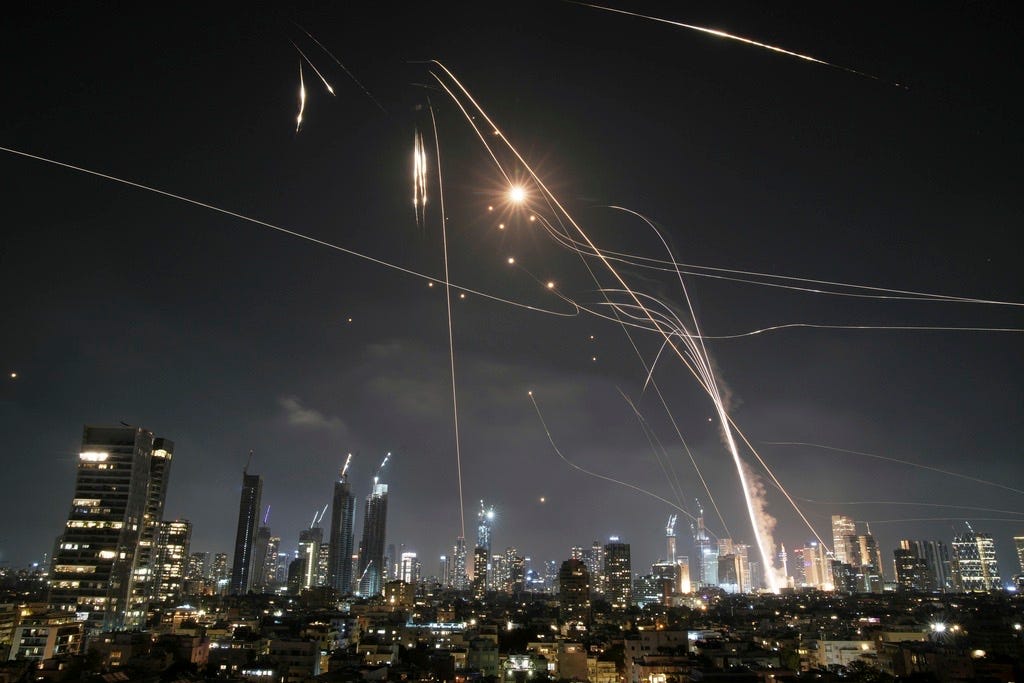Let's Not Make the Same Mistake Israel Made With Missile Defense Systems
Missile defense systems are modern marvels, but they also enable us to become complacent to threats.
Israel’s 12 day war with Iran was essentially a trade show for American and Israeli military tech, which was already in high demand before demand. As countries worldwide prepare for escalating threats to their homeland over the next few years, many countries in Europe and Asia have purchased Israeli missile defense technology like David’s Sling and Arrow systems in case their territory comes under fire from either Russia or China. Trump’s “Big Beautiful Bill”, which was signed into law on the 4th of July, included $150 billion to be allocated to building a “Golden Dome” system similar to Israel’s Arrow system. While missile defense systems are cool, and are likely necessary in a world of increasing threats, we need to make sure we don’t repeat Israel’s mistakes when it comes to missile defense systems. Namely, we can’t rely too heavily on them.
Israel began developing the 2000s to intercept rockets launched at Israel by Hamas out of the Gaza Strip after Hamas came to power after winning the 2004 elections in Gaza, and then subsequently winning the Civil War between Hamas and Fatah in the Gaza Strip in 2005. It was declared operational in 2011, and has likely intercepted over 5,000 rockets according to its manufacturer Rafael. The David’s Sling and Arrow systems were developed after the Iron Dome’s effectiveness was proven, David’s Sling to intercept mid-range rockets and more sophisticated missiles launched by Hezbollah and other adversaries, and Arrow being an inter-atmospheric system meant to intercept more sophisticated Hezbollah missiles as well as missiles launched from Iran. These systems are all incredibly effective—normal missile defense systems are expected to intercept 80% of threats, but in the latest phase of the long-standing cold war between Israel and Iran, these systems intercepted 94% of the missiles launched at Israel.
The problem with these systems’ effectiveness is they allowed the Israeli public to become complacent amid the threats to Israel from Gaza, Lebanon, Yemen and Iran. It became normal for Israelis to hear sirens, head to their bomb shelters (sometimes), and watch these systems intercept the threats with extreme precision, allowing the Israelis to go about living their normal lives as if their enemies were not engaging in a war against them. Had the Israelis not felt so comfortable despite constantly coming under threat from their enemies, Hamas may not have been able to surprise the Israeli public so much with their attack on October 7th, 2023.
October 7th was such a shock because it did psychological damage to the Israeli public and their military brass—it made them question their military effectiveness and their Intelligence Services’ assessments of threats to the Israeli public, both of which were not questioned by the Israeli public at large prior to the October 7th attacks. While the IDF and Mossad have likely made up for their shortcomings on 10/7 in the eyes of the public given their success in dismantling Iran’s Axis of Resistance proxy network, partners of Israel are at risk of the same mistakes Israel made if they implement similar tech and become complacent about threats from their enemies.
Since 10/7, Germany, Finland, Slovakia, and most recently Romania have announced deals with Israel to buy access to their missile defense systems in order to prepare for looming threats from Russia. In Asia, which is likely to be the most important geopolitical theater over the next 30 years in terms of warfare; India, Vietnam, The Philippines, and Thailand all have made deals to purchase weapons systems like missile interception systems as well as satellites from Israel. President Trump’s “Golden Dome” which was allocated funding in the “Big Beautiful Bill” is modeled after Israel’s systems. All of these countries—as well as the countries likely to make deals with Israel once the Gaza war ends—are at risk of falling victim to false senses of security just like Israel did if they are not careful.
It is true that Israel’s missile defense systems are modern marvels in terms of military technology which enabled people to go about life as normal despite periods of rocket fire bombardment. It is also true that had these systems not existed, Israel would have had to take out the threats, in Gaza and Lebanon in particular, before they amassed such a large stockpile of weapons, or had the ability to plan large attacks like October 7th. While it is a good idea for all parties involved to buy these systems to protect themselves—it’s also a good idea for our friends in Europe and the Indo-Pacific to plan for these systems to be used to mitigate the affects of wars on their populations rather than pretend inevitable wars will never happen, or attempting to delay them.
Wars are best fought when they can be easily won—when the enemy is at a disadvantage because they are caught off guard, or out-gunned. We need to make sure these missile defense systems are used in a manor which puts our allies at the advantage, such as understanding their importance in an offensive operation, rather than using them to delay or deter potential attacks from their adversaries.





